‘Into The Woods’ Producer Marc Platt On Sondheim, Streep & Sam Cohn: Conversations With Jeremy Gerard
EXCLUSIVE: Two of Hollywood’s favorite concepts — mash-up and reboot — converge with the Christmas Eve opening of Into The Woods, Stephen Sondheim and James Lapine’s big-screen, bold-face transformation of their great Broadway show featuring Rapunzel, Cinderella, Prince Charming, Red Ridinghood, Beanstalk Jack, the Giant and, of course, a Witch, played by Meryl Streep.
For producer Marc Platt and director Rob Marshall, the premiere comes five years to the day since the equally starry unveiling of Nine, their last Broadway-to-film adaptation, with Daniel Day-Lewis playing a celebrated film director based on Federico Fellini. That did not have a happy outcome (budget: $80 million; box office gross: $20 million) but early indications suggest that Into The Woods will provide vindication for Platt, a risk-taker who has been working both coasts as Hollywood and Broadway producer after stints as president of production at Universal, TriStar and Orion. Platt is deep into work on several other films, including Ricki And The Flash, also starring Streep and directed by Jonathan Demme.
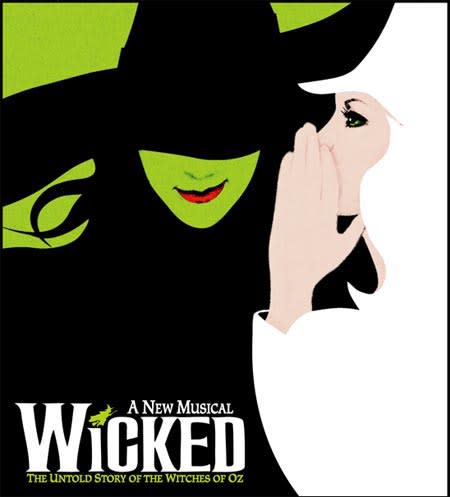
We met in the Times Square office he shares with business partner David Stone, overseeing the global franchise that is Wicked, the Stephen Schwartz and Winnie Holzman prequel to The Wizard Of Oz that, despite the best efforts of critics (myself included) to dismiss it, has taken in some $3 billion at the world-wide box office, minted a star in Idina Menzel and continues, after 12 years, to sell out the Gershwin Theatre’s 1,900 seats eight times a week. If, as Ben Brantley wrote in the New York Times, “Wicked does not, alas, speak hopefully for the future of the Broadway musical,” may all of us be doomed to such a grim fate.
JEREMY GERARD: Is Into The Woods your first Sondheim project?
MARC PLATT: It’s certainly my first in an official capacity working with Steve. I’ve enjoyed a wonderful collaboration with Rob Marshall and his partner John DeLuca. We all have roots that go back into the theater, we know many of the same people, and I’ve worked with his sister Kathleen before, produced a TV musical for her, and we collaborated on the film Nine.
GERARD: Which I loved but which didn’t get much love from anyone else…
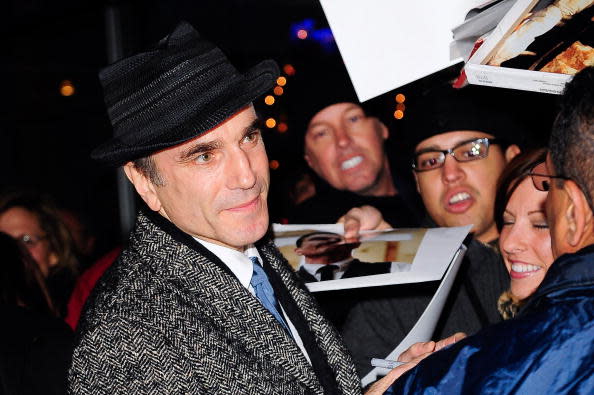
PLATT:
Oh, thank you! It was a challenging film to make, and tough. Adaptations, especially movie musicals, are really hard to do. Rob and John and I enjoyed a great collaboration there. So Rob was developing Into the Woods and did a reading of it, they invited me and said, “Will you come aboard and produce it with us?” I had flirted with that material before, both as the head of the studio when I was at TriStar, there was a script that Columbia wasn’t going to make and they brought it to me. It was geared more toward Billy Crystal, as I recall, and Cher. It really veered very far from the original material, so it wasn’t for me.
GERARD: What were you seeing, as a film executive, was the appeal of turning this into a movie?
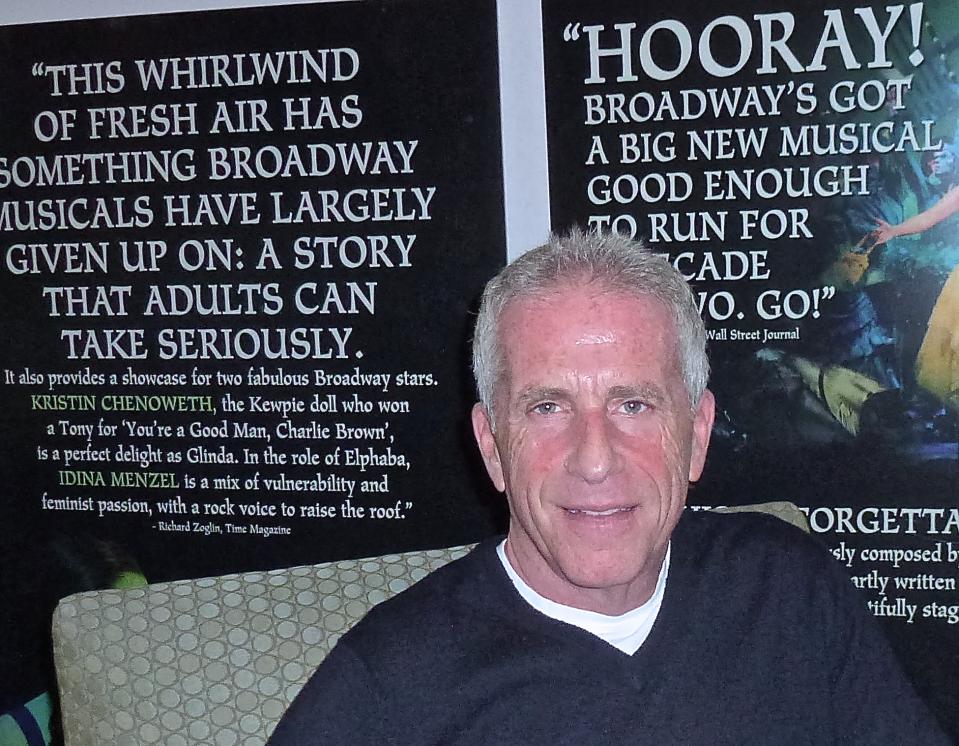
PLATT:
Well I, as a fan of musical theater and of Steve Sondheim, it’s hard not to have always thought about all these characters who are very familiar and take kind of unexpected turns.
GERARD: Not unlike Wicked.
PLATT: Not unlike Wicked at all, actually. I also have five children. I saw Into the Woods maybe 26 times in various incarnations. I’m very familiar with it. The themes and ideas embedded in Into the Woods always spoke to me. Then Rob came to me and said the time felt right because some of the themes in it really spoke to him. He had listened to the 9/11 memorial, the 10-year anniversary, and heard the speech that President Obama gave talking to the families of the 9/11 victims and in essence saying, “You’re not alone. We’re here together. We’re a community.”
GERARD: Venturing forward, what needed to happen in that transition?
PLATT: The challenges were to render a beloved piece as accessible as possible and yet be true to it and find that balance. In any adaptation the challenge is to take the essence of the original source of the material, be faithful to it to a point, but to also recognize that you’re telling a story in a very different medium. It has to exist on its own and it has to offer something unique to that experience. It’s no different from when you take a film and try to put it up on stage, as many people do, and certainly no different if we take a stage musical and put it up and attempt to find the cinematic language for the film. That’s the initial challenge, and particularly when there’s a piece that’s beloved by a rabid fan base. You feel that challenge even more so, because you don’t want to disappoint the fans but you also have to deliver an entertainment that will be experienced by the broadest possible audience.
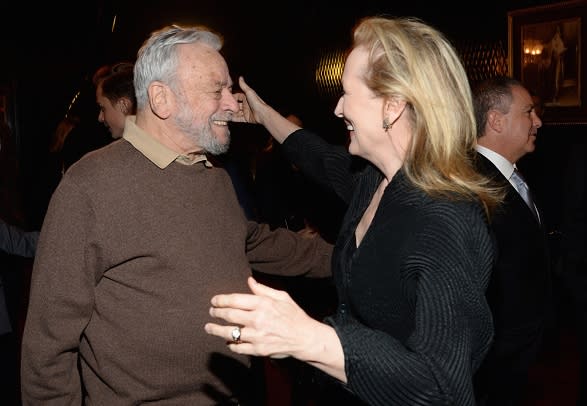
GERARD: What were the conversations with Steve Sondheim and James Lapine like in making that happen?
PLATT: Steve and James recognized that this needed to work as a film, this was a great opportunity, so when decisions were made that involved, “We may have to take out this song or take out that song,” they were, “Let’s let it go.” I mean no one likes to murder your babies if you don’t have to, but they were both aggressive in solving those problems and editing and recognizing that what works on page doesn’t work on film.
GERARD: Can you give me an example?
PLATT: There’s a song in the show, “No More.” People who know the show well love that song. It plays off a character that takes a journey throughout the piece, which is the narrator, in the stage musical version. The refrain is in response to these questions that the narrator has been asking throughout the whole piece, almost like riddles. Well, that’s a wonderful, but very theatrical, device, that doesn’t work well on screen. The tone of the film is very reality-based in a fantasy world that’s created for the film. And so, painful as it was to take it out, that was one of the reasons that we decided to.
It was also very long on stage, where you can do three hours and you have an intermission. The darker part of the world that isn’t happily-ever-after is in the third act of the movie, not the whole second half, and there were many, many ballads; in the film version you couldn’t weigh it with ballad after ballad after ballad, so that became a decision.
GERARD: And wasn’t there at least one new song for the film?
PLATT: Steve wrote a really wonderful song, performed wonderfully by Meryl Streep, beautifully shot, but when the picture was put together it was clear that that song, as good as it was, didn’t forward the narrative. It was so close to “The Last Midnight,” which is also the Witch’s song, that they kind of battled each other. Once the new song was removed everything sort of had liftoff. That’s a hard decision, because in the world we’re living in, people like to get nominations. So you write a new song [making it eligible for Oscar consideration], but at the end of the day Steve Sondheim, James Lapine, and Rob Marshall were all very committed to serving the story. Hopefully that will speak for itself when you see the film.
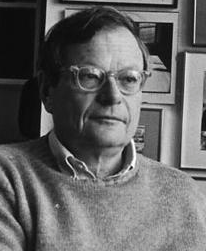
GERARD: In your salad days you worked for Sam Cohn, the superagent who took lunch at the Russian Tea Room, chewed Kleenex and was legendary for his ferocious devotion to his clients, practically inventing package deals that put together his writers, actors and other creatives. What was he like to work for?
PLATT: Well, Sam Cohn was my mentor and a great influence in my life. As a 26 year old kid, I was sitting in a little office, and a young Meryl Streep would come in, and Mike Nichols, who just passed, Nora Ephron, who was a dear friend. Many people I made movies with, in my career, as a studio executive and as a producer, I met those people through Sam, it was never ending. I got to observe someone who was so passionate about art and artists but showed me what to do with that passion and how one could facilitate and actually make dreams come true and facilitate people and projects and logistics. All of that may sound obvious but it’s not, and learning how to move from A to B to C or learning how to take an idea in your head, actually move it forward and create something … he was a brilliant packager and he represented so much great talent. Every night I would take Sam to the theater or the opera or a concert, and it was a brilliant education, and it changed my life professionally. A lot of what I’ve been able to accomplish or do is because of what I learned from him, and I also loved him dearly. All things lead back to Sam Cohn.
GERARD: How so?
PLATT: My theory is, there’s a place for everything, it’s how you put it together. So [the musical] Next to Normal had to be small, in terms of what it cost, so that it didn’t have to run forever to be commercially successful and yet have an artistic shot at being what it wanted to be and having the world experience it.
On the film side, I went to Disney, who weren’t sure about Into the Woods and I said, “Look, give me a box, tell me it can only cost X and it has to have this kind of cast; give me the box and let me do the work and figure out how to do it,” and that’s just what they did. They said, “We’ll only make it for X amount, it has to have at least three or four of this group of actors,” and we put it together. It could have been made for a lot more money, it could have had a lot more visual effects, but esthetically that’s not what we wanted, and economically it didn’t make sense, who wants that burden?
And I think there was an upside to Broadway shows being [seen globally] — because if someone who never went to a Broadway show sees Wicked, they may have thought, “Oh my God, I didn’t realize that musicals were that entertaining. I want to go see another one.” You deliver what you want to, to the world, you tell the stories you want to tell. You just have to figure out how to tell them. That’s the producer’s job.
GERARD: Let me close this out with a question for both theater and film. What are the biggest challenges facing Broadway and film producers today?
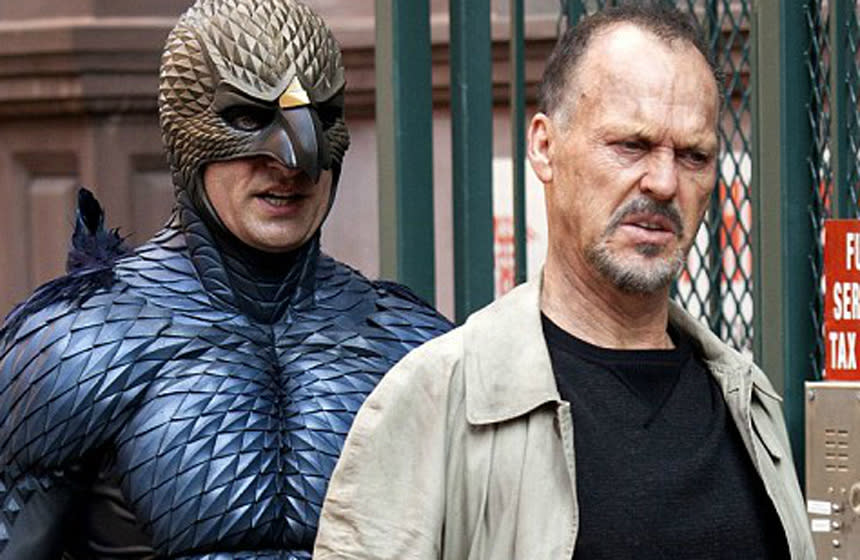
PLATT:
Well, it’s an interesting time as the movie business figures itself out from the business model side. Franchises have become the thing that everyone’s looking for, what’s franchisable and how can we make something that we can make five, six, seven, or eight of? But look at the films this year, you have Boyhood, you have Birdman — really interesting movies that weren’t made in the studios. They’re still getting made, and people are still seeing them. The challenge for the producer is, don’t be daunted, when you have the franchise movie you go to the studio, when you have a project that’s smaller, more challenging, you go an alternative route, you put together a cast first and you find independent money. You have to work a little harder but there’s an appetite for it.
The same is true in the Broadway world, I think. The financial side of Broadway is the easy part. Plenty of people want to put money in a Broadway show. The challenging part is finding the material that excites me enough to spend a couple of years of my life devoted to it. Making an original musical is really hard. The challenge, again, is to find the right story, put together the right elements and make it sing.
Related stories
UK Magician Troy Von Scheibner To Star In New Unscripted Series On Syfy
Shah Rukh Khan's 'Happy New Year' Released Direct To Fans Online
ITV Invests In Ex-Maker CEO's Zealot Networks
Get more from Deadline.com: Follow us on Twitter, Facebook, Newsletter

